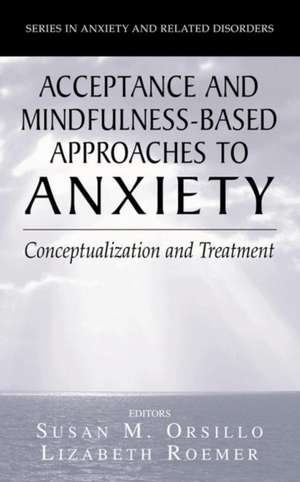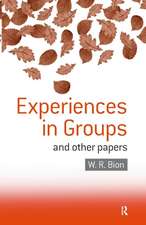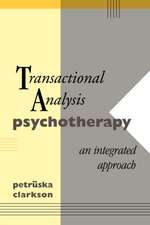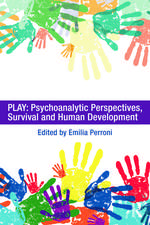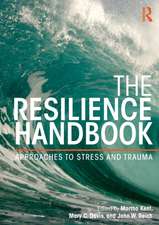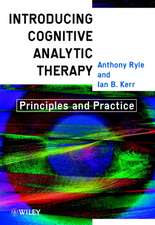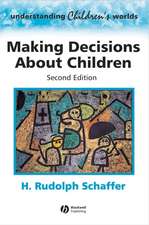Acceptance- and Mindfulness-Based Approaches to Anxiety: Conceptualization and Treatment: Series in Anxiety and Related Disorders
Editat de Susan M. Orsillo, Lizabeth Roemeren Limba Engleză Hardback – 7 noi 2005
Chapter authors clearly place mindfulness and acceptance into the clinical lexicon, establishing links with established traditions, including emotion theory and experiential therapy. In addition, separate chapters discuss specific anxiety disorders, the current state of treatment for each, and practical ways of integrating acceptance and mindfulness approaches into therapy.
| Toate formatele și edițiile | Preț | Express |
|---|---|---|
| Paperback (1) | 701.72 lei 6-8 săpt. | |
| Springer Us – 8 dec 2010 | 701.72 lei 6-8 săpt. | |
| Hardback (1) | 953.65 lei 6-8 săpt. | |
| Springer Us – 7 noi 2005 | 953.65 lei 6-8 săpt. |
Preț: 953.65 lei
Preț vechi: 1162.99 lei
-18% Nou
Puncte Express: 1430
Preț estimativ în valută:
182.48€ • 190.52$ • 151.03£
182.48€ • 190.52$ • 151.03£
Carte tipărită la comandă
Livrare economică 05-19 aprilie
Preluare comenzi: 021 569.72.76
Specificații
ISBN-13: 9780387259888
ISBN-10: 0387259880
Pagini: 375
Ilustrații: XVIII, 376 p.
Dimensiuni: 155 x 235 x 24 mm
Greutate: 0.68 kg
Ediția:2005
Editura: Springer Us
Colecția Springer
Seria Series in Anxiety and Related Disorders
Locul publicării:New York, NY, United States
ISBN-10: 0387259880
Pagini: 375
Ilustrații: XVIII, 376 p.
Dimensiuni: 155 x 235 x 24 mm
Greutate: 0.68 kg
Ediția:2005
Editura: Springer Us
Colecția Springer
Seria Series in Anxiety and Related Disorders
Locul publicării:New York, NY, United States
Public țintă
Professional/practitionerCuprins
Integrating Acceptance and Mindfulness and Existing Psychological Traditions.- Acceptance-Based Behavioral Therapies for Anxiety.- Emotion and the Acceptance-Based Approaches to the Anxiety Disorders.- General Approaches to Assessment and Treatment.- Assessing Mindfulness and Experiential Acceptance.- Acceptance and Commitment Therapy as a Treatment for Anxiety Disorders.- Mindfulness-Based Stress Reduction.- Applying DBT Mindfulness Skills to the Treatment of Clients with Anxiety Disorders.- Specific Populations.- Integrating Acceptance and Mindfulness with Cognitive Behavioral Treatment for Panic Disorder.- An Acceptance and Mindfulness-Based Perspective on Social Anxiety Disorder.- An Acceptance-Based Behavior Therapy for Generalized Anxiety Disorder.- Acceptance and Mindfulness-Based Approaches to the Treatment of Posttraumatic Stress Disorder.- Mindfulness- and Acceptance-Based Behavior Therapy for Obsessive-Compulsive Disorder.- Integrating Acceptance and Mindfulness into Treatments for Child and Adolescent Anxiety Disorders.- Future Directions.- Exploring Basic Processes Underlying Acceptance and Mindfulness.
Recenzii
Orsillo and Roemer are true scientist-practitioners with their broad and deep knowledge of cognitive behavioral concepts and their years of applying these concepts to relieve suffering from anxiety. In this book they take us to the cutting-edge of new psychological approaches to anxiety disorders. Every clinician will want to be aware of these latest advances.
David H. Barlow, Ph.D.
Director, Center for Anxiety and Related Disorders at Boston University
Professor of Psychology
Research Professor of Psychiatry
Few others could make the case for acceptance and mindfulness-based care of anxiety disorders as well as Orsillo and Roemer have done. Tacking deftly between innovation and empirical science this book shows how traditional anxiety treatments, supplemented by acceptance and mindfulness practices, can achieve an expanded scope of relevance and efficacy. Their careful operationalization and description of these practices along with a few caveats regarding this nascent union, enables the reader to navigate comfortably in novel territory. Ideal for therapists, researchers and students the material presented in this book will likely form the backbone of the next generation of treatment for complex anxiety disorders.
-Zindel V. Segal, Ph.D., C.Psych.
Morgan Firestone Chair in Psychotherapy
Professor of Psychiatry and Psychology
University of Toronto.
In their innovative work toward a more complete understanding of the etiology and treatment of anxiety disorders, and in their special concern for those patients who do not respond to existing treatments, Drs Roemer and Orsillo have led the field into new territory. In the past ten years, the integration of mindfulness-based approaches into existing psychological systems and therapies has been both informing and challenging for each side of the meeting. This timely book contains a useful summary of the many facets of this conversation, including the differing approaches to mindfulness and its use in clinical systems. It provides an excellent description of the development and progression of CBT approaches to the treatment of anxiety disorders and cogently presents the case for the natural progression of the integration of mindfulness and acceptance-based approaches into this field.
James Carmody Ph.D.
Director of Research, Center for Mindfulness in Medicine, Healthcare and Society
Assistant Professor of Medicine
Division of Preventive & Behavioral Medicine
University of Massachusetts Medical School
David H. Barlow, Ph.D.
Director, Center for Anxiety and Related Disorders at Boston University
Professor of Psychology
Research Professor of Psychiatry
Few others could make the case for acceptance and mindfulness-based care of anxiety disorders as well as Orsillo and Roemer have done. Tacking deftly between innovation and empirical science this book shows how traditional anxiety treatments, supplemented by acceptance and mindfulness practices, can achieve an expanded scope of relevance and efficacy. Their careful operationalization and description of these practices along with a few caveats regarding this nascent union, enables the reader to navigate comfortably in novel territory. Ideal for therapists, researchers and students the material presented in this book will likely form the backbone of the next generation of treatment for complex anxiety disorders.
-Zindel V. Segal, Ph.D., C.Psych.
Morgan Firestone Chair in Psychotherapy
Professor of Psychiatry and Psychology
University of Toronto.
In their innovative work toward a more complete understanding of the etiology and treatment of anxiety disorders, and in their special concern for those patients who do not respond to existing treatments, Drs Roemer and Orsillo have led the field into new territory. In the past ten years, the integration of mindfulness-based approaches into existing psychological systems and therapies has been both informing and challenging for each side of the meeting. This timely book contains a useful summary of the many facets of this conversation, including the differing approaches to mindfulness and its use in clinical systems. It provides an excellent description of the development and progression of CBT approaches to the treatment of anxiety disorders and cogently presents the case for the natural progression of the integration of mindfulness and acceptance-based approaches into this field.
James Carmody Ph.D.
Director of Research, Center for Mindfulness in Medicine, Healthcare and Society
Assistant Professor of Medicine
Division of Preventive & Behavioral Medicine
University of Massachusetts Medical School
Textul de pe ultima copertă
Acceptance- and Mindfulness-Based Approaches to Anxiety:
Conceptualization and Treatment
Edited by Susan M. Orsillo, Suffolk University, Boston
Lizabeth Roemer, University of Massachusetts, Boston
For many years, cognitive-behavioral techniques have been at the forefront of treatment for anxiety disorders. More recently, strategies rooted in Eastern concepts of acceptance and mindfulness have demonstrated some promise in treating anxiety, especially in tandem with CBT. Now, with Acceptance and Mindfulness-Based Approaches to Anxiety, thirty expert clinicians and researchers present a comprehensive guide to integrating these powerful complementary approaches—where they match, when they differ, and why they work so well together.
Chapter authors clearly place mindfulness and acceptance into the clinical lexicon, establishing links with established traditions, including emotion theory and experiential therapy. In addition, separate chapters discuss specific anxiety disorders, the current state of treatment for each, and practical ways of integrating acceptance and mindfulness approaches into therapy.
Among the book’s highlights:
- A detailed conceptual framework for combining acceptance-based and cognitive-behavioral approaches
- Clinically valid definitions of acceptance and mindfulness, explaining their compatibility with more goal-driven and problem-solving therapies
- Discussion on how acceptance and mindfulness can be accurately assessed
- Demonstrations of three specific methods—Acceptance and Commitment Therapy, Mindfulness-Based Stress Reduction, and Dialectical Behavioral Therapy skills training—as used in treating clients with anxiety disorders.
- Treatment models for generalized anxiety disorders, obsessive-compulsive disorder, PTSD, social anxiety, and panic disorder
- A specificchapter on applications of acceptance-based therapies for childhood anxiety disorders
- Future directions for bettering our understanding of how these therapies work
As the growing number of cases shows, anxiety remains a major clinical disorder, and practitioners need ready access to ideas and interventions. With this book, editors Orsillo and Roemer have created a forum inspiring future innovations and current best practice.
Conceptualization and Treatment
Edited by Susan M. Orsillo, Suffolk University, Boston
Lizabeth Roemer, University of Massachusetts, Boston
For many years, cognitive-behavioral techniques have been at the forefront of treatment for anxiety disorders. More recently, strategies rooted in Eastern concepts of acceptance and mindfulness have demonstrated some promise in treating anxiety, especially in tandem with CBT. Now, with Acceptance and Mindfulness-Based Approaches to Anxiety, thirty expert clinicians and researchers present a comprehensive guide to integrating these powerful complementary approaches—where they match, when they differ, and why they work so well together.
Chapter authors clearly place mindfulness and acceptance into the clinical lexicon, establishing links with established traditions, including emotion theory and experiential therapy. In addition, separate chapters discuss specific anxiety disorders, the current state of treatment for each, and practical ways of integrating acceptance and mindfulness approaches into therapy.
Among the book’s highlights:
- A detailed conceptual framework for combining acceptance-based and cognitive-behavioral approaches
- Clinically valid definitions of acceptance and mindfulness, explaining their compatibility with more goal-driven and problem-solving therapies
- Discussion on how acceptance and mindfulness can be accurately assessed
- Demonstrations of three specific methods—Acceptance and Commitment Therapy, Mindfulness-Based Stress Reduction, and Dialectical Behavioral Therapy skills training—as used in treating clients with anxiety disorders.
- Treatment models for generalized anxiety disorders, obsessive-compulsive disorder, PTSD, social anxiety, and panic disorder
- A specificchapter on applications of acceptance-based therapies for childhood anxiety disorders
- Future directions for bettering our understanding of how these therapies work
As the growing number of cases shows, anxiety remains a major clinical disorder, and practitioners need ready access to ideas and interventions. With this book, editors Orsillo and Roemer have created a forum inspiring future innovations and current best practice.
Caracteristici
Topic discussed in book is very timely, as acceptance and mindfulness have become a major feature of what is emerging as the new integrative cognitive therapy Currently no other book that applies this approach to anxiety disorders Includes supplementary material: sn.pub/extras
